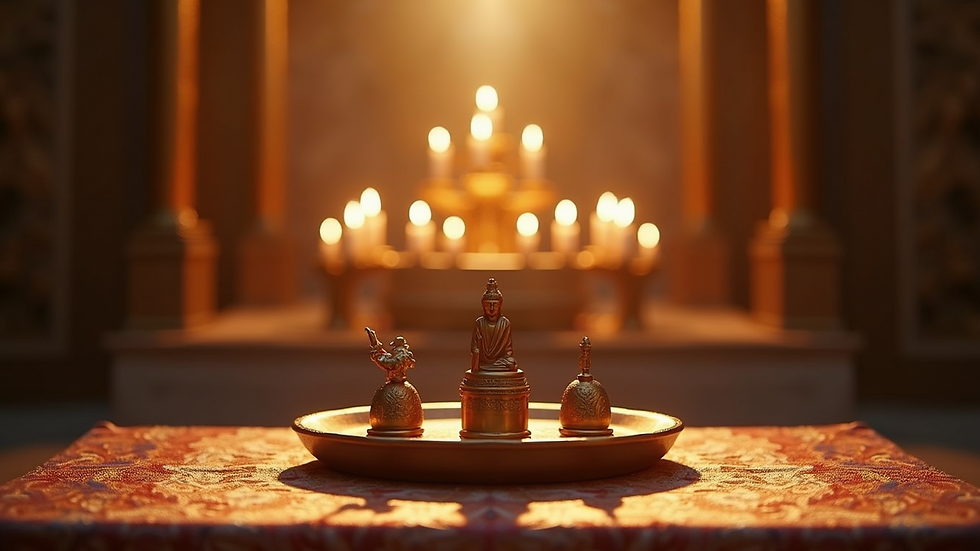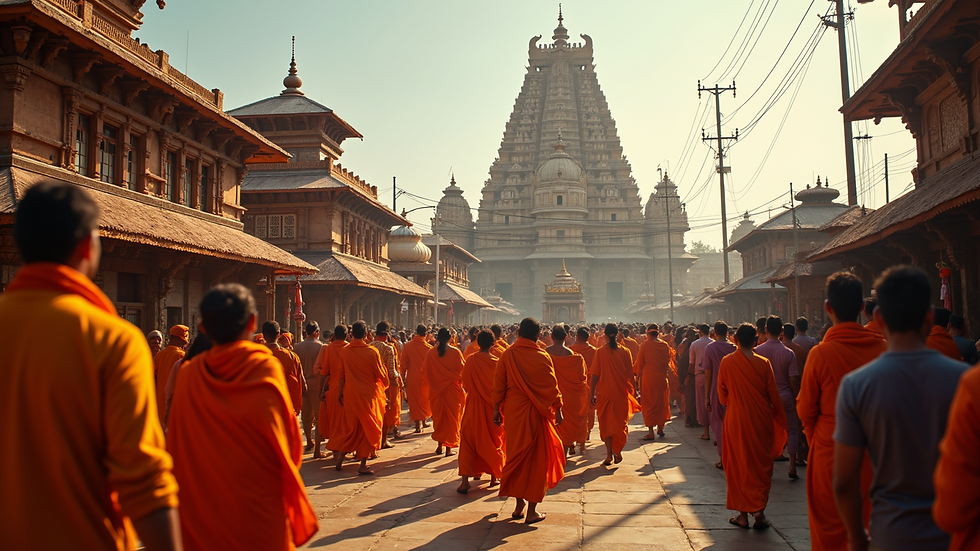The Spiritual Significance and Importance of Ekadashi
- Sennguru

- Jul 19, 2025
- 4 min read
Ekadashi, the 11th lunar day of each fortnight in the Hindu calendar, is a day dedicated to worship, fasting, and spiritual growth. Many believers fast on Ekadashi, seeking a deeper connection with the divine. It offers an opportunity to practice self-discipline, enhance spirituality, and seek redemption. Understanding the significance of Ekadashi can guide individuals on their spiritual path.
What is Ekadashi?
Ekadashi is observed twice a month, once during the waxing phase (Shukla Paksha) and once during the waning phase (Krishna Paksha) of the moon. Each Ekadashi holds its own significance and rituals that devotees follow. The word "Ekadashi" means eleven in Sanskrit, which indicates this day is the 11th day in the lunar cycle.
Many significant texts from Hindu scriptures, including the Puranas, emphasize the importance of observing Ekadashi. It's a time when one disconnects from worldly distractions, refrains from eating grains, and focuses on spiritual practices.

The Spiritual Benefits of Observing Ekadashi
Observing Ekadashi is believed to bring numerous spiritual benefits. Fasting on this day is said to purify the mind and body. Here are some spiritual advantages:
Detoxification: The body undergoes a detoxification process when fasting, as it gives the digestive system a break. This can contribute to physical health but also helps enhance spiritual clarity.
Increased Devotion: Observing Ekadashi aids in deepening one's devotion to God. It fosters a space for reflection, prayer, and connecting with one's inner self.
Overcoming Temptation: The self-restraint practiced during Ekadashi helps individuals overcome desires and attachments, allowing for a more spiritual and fulfilling life.
Many people who observe Ekadashi report a profound sense of peace and contentment. This experience reinforces their faith and spiritual journey.

Rituals Associated with Ekadashi
Each Ekadashi may have specific rituals and significance. Below are common practices observed during this sacred day:
1. Fasting
Fasting is the cornerstone of Ekadashi observance. While some choose to fast completely, others may consume fruits and nuts. The purpose is to abstain from grain and excessive food, focusing instead on spiritual activities.
2. Prayer and Chanting
Devotees engage in prayers and chanting mantras dedicated to Lord Vishnu, believed to bless and protect those who follow Ekadashi. Chanting the names of Vishnu or reading the Bhagavad Gita can enhance devotion during this time.
3. Visiting Temples
Many individuals choose to visit temples on Ekadashi. Devotees participate in communal prayers and rituals, fostering a sense of community and networking with others on a similar spiritual journey.
4. Charity
Acts of kindness and charity are encouraged during Ekadashi. Donating food or supporting those in need is a way to manifest compassion and generosity, aligning with spiritual growth during this time.
These rituals serve to strengthen the bond with the divine and cultivate virtues important for spiritual progression.
Understanding the Different Types of Ekadashi
There are well over 20 Ekadashis in a year, and each has its own importance and mythology. Here are a few notable Ekadashis:
1. Nirjala Ekadashi
Nirjala Ekadashi, considered the most significant, falls during the Shukla Paksha in the month of Jyeshtha. On this day, devotees abstain from food and water, and many believe that observing this Ekadashi can eradicate all sins.
2. Devshayani Ekadashi
Devshayani Ekadashi marks the beginning of the four-month Chaturmas period. It is believed that Lord Vishnu sleeps for this duration, and people engage in rituals to prepare for the devotees' return.
3. Paush Ekadashi
Paush Ekadashi, occurring in the month of Paush, is believed to liberate souls from the cycle of rebirth. Many observe strict fasting and engage in prayers for departed souls.

The Significance of Ekadashi in Modern Times
In today's fast-paced world, the significance of Ekadashi may seem diminished. However, its roots in spirituality and self-discipline are more relevant than ever. Here’s why observing Ekadashi can be beneficial for modern practitioners:
Mindfulness and Reflection: Ekadashi encourages individuals to become more mindful. Taking a break from daily distractions promotes self-reflection and inner peace.
Healthy Living: The practice of fasting, even if done partially, can lead to healthier habits in today’s consumer-driven society. It teaches moderation and encourages healthy eating patterns.
Connecting with Tradition: In a globalized world, engaging in traditional practices like Ekadashi fosters a sense of belonging and identity. It allows one to connect deeply with ancestral values.
As we navigate the complexities of modern life, the values and tenets taught through Ekadashi can be a source of strength and clarity.
Embracing the Spirit of Ekadashi
To fully embrace the spirit of Ekadashi, consider incorporating the following practices:
Start Slow: If you are new to observing Ekadashi, start with partial fasting or engaging in simple prayers. Gradually enhance your practices.
Create a Ritual Space: Dedicate a space in your home for meditation or prayer. This environment encourages focus and devotion on Ekadashi.
Reflect and Journal: Use the days surrounding Ekadashi for reflection and journaling. Document your thoughts, feelings, and progress on your spiritual journey.
Engage with Community: Join local groups or online communities that celebrate Ekadashi. Sharing experiences can enhance your understanding and commitment.
Embracing Ekadashi is not merely about maintaining traditions; it is about fostering a deeper connection with the self and the divine.
By observing Ekadashi, individuals not only enhance their spiritual journey but also cultivate several virtues essential for personal growth. The importance of Ekadashi lies in its ability to connect us with our spiritual roots while encouraging a life of mindfulness, health, and community.
The spiritual significance of Ekadashi transcends generations, offering timeless wisdom for all who seek it on their life’s journey.


Comments